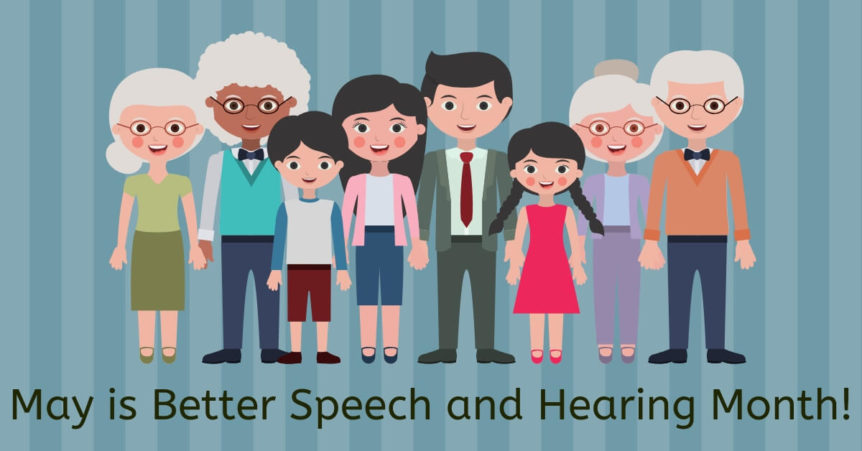When it comes to communicating, we all struggle from time to time. In places with a lot of background noise, or when someone is yelling from another room, we have a hard time following what’s been said. For someone with hearing loss, communicating can be a real struggle, even in a quiet place. If you have a loved one straining to hear, here are a few tips to help them hear better, and include them in the conversation.
American Speech Language Hearing Association
May is Better Hearing and Speech Month! What better time to think about the hearing health of your loved ones, and help everyone communicate clearly, whatever their age. Join the American Speech-Language-Hearing Association (ASHA) as they raise awareness about communication disorders, and educate Americans about the roles of ASHA members such as audiologists, speech-language pathologists, speech, language, and hearing scientists, and speech-language pathology support personnel who work tirelessly to provide you with clear communication. You can find more information and resources about Better Hearing and Speech Month at http://www.asha.org/bhsm/. This May, the theme is “Communication Across the Lifespan” so do your part in helping your loved ones communicate.
Always Speak Face to Face
If your loved one is struggling to hear, make sure you always face them when speaking. Don’t yell from another room, or talk to them while your back is turned, since this will make it very difficult for them to understand you. They’re relying on seeing your facial cues and expressions to help them hear. If they’re sitting down, pull up a chair and get onto their level. No one like to strain their neck to stare up at someone, and it’s more comfortable for everyone if you’re on the same level.
Turn Down the Volume
If you’re at home or at a friend’s house, turn down the volume of any background music, turn off the TV, or send the kids to play in the backyard. You’ll have a much easier time communicating if there aren’t a lot of competing background sounds, and your loved one can focus on what’s being said. If you meet at a coffee shop or restaurant, pick a quiet corner, away from any sources of sound like the front entrance, the kitchen, or even another loud party so that there will be the least amount of distracting sounds.
Speak Normally
When talking to someone with hearing loss, it’s tempting to shout, slow down speech, or exaggerate the words. Resist the urge to yell, and speak in a normal way. Yelling will distort the words, and make it even harder for them to understand you. Speaking slowly adds unnatural gaps, and will also make it difficult to follow what you’re trying to communicate. Rather, insert a few pauses between sentences, and give your loved one time to catch up with what’s been said. Keep your hands away from your mouth, and speak clearly.
Rephrase What’s Been Said
Are you met with a puzzled look when you’ve finished speaking? What do you do when your loved one asks you to repeat yourself? Rather than repeating what you said word for word, rephrase what’s been said. Repeating it will just repeat sounds that your loved one can’t hear, so finding another way to say it will give them a new opportunity to hear and understand what you’ve said.
Encourage Your Loved One to Take a Hearing Test
If your loved one doesn’t have hearing aids, and is clearly struggling to communicate, encourage them to schedule a hearing test. Use Better Hearing and Speech Month as motivation to help them look after their hearing health, and get the help they need. Let them know you support them, and will be with them every step of the way on their journey to finding the right hearing aids and hearing clearly. Sadly, many Americans wait 5 to 7 years before treating their hearing loss! In this time, they experience a lot more damage both to the cells in their ears and in their brain.
Let Neighborhood Hearing Aid Center help. Our team of hearing health specialists will identify the kind of hearing loss your loved one has, and find the perfect treatment options so they’ll be able to communicate easily in any listening environment.

